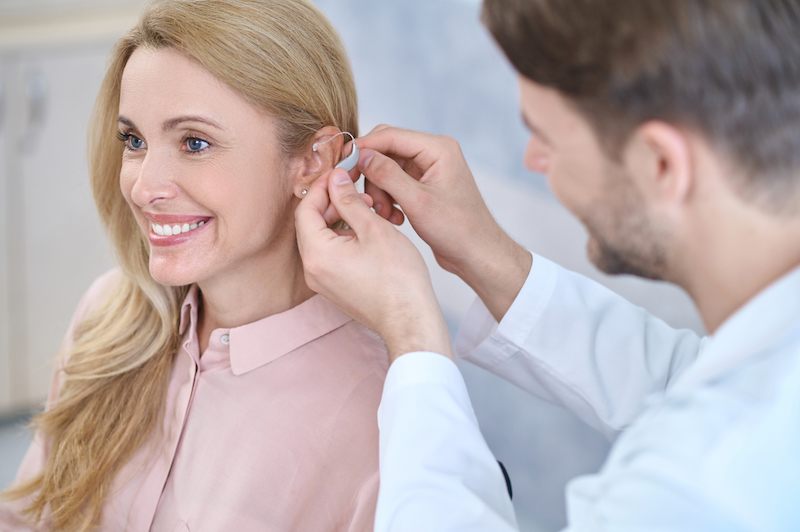What is sensorineural hearing loss?
There are three common types of hearing loss: conductive hearing loss, sensorineural hearing loss, and mixed hearing loss. (Mixed hearing loss is a combination of conductive and sensorineural hearing loss.)
Conductive hearing loss is generally caused by blockage in the ear, or ear infections that occur in the middle or inner ear.
Often, conductive hearing loss is treatable, either through medication, professional ear cleaning, surgical, or other non-surgical treatments.
Sensorineural hearing loss is the most common form of hearing loss there is. This type of hearing loss typically occurs due to damage that has been done to your inner ear, most commonly its nerve pathways or the small hairs that are found in the cochlea.
Once this damage has been done, it cannot be reversed. There is no way to repair these nerve pathways or to regenerate or replace the damaged hairs.
Despite this, there are ways in which hearing loss can be treated that will enable those experiencing it to preserve the hearing they have and increase their capacity to hear certain sounds.
How do you get sensorineural hearing loss?
There are many ways in which sensorineural hearing loss can occur. The most common ways include:
- Naturally, from aging
- Exposure to loud noises (either over prolonged periods or in very loud bursts, like gunshots, explosions, loud music, fireworks, etc.)
- Head trauma
- Hereditary predisposition to hearing loss
- Medical anomalies, such as how the inner ear was formed during fetal development
- Ototoxic medications (medicines that are toxic to the hearing system)
Though it is not the same for all those who experience sensorineural hearing loss, it very often will diminish your ability to hear high frequency sounds first. These sounds include many speech sounds, like “sk,” “ch,” “st,” as well as higher frequency voices, like those of children and many women.
Hearing loss can affect you no matter what your gender, but it does tend to happen more frequently with men.
What are common signs of sensorineural hearing loss?
- Difficulty hearing or understanding the voices of women and children
- Often asking people to repeat themselves when speaking to you
- Trouble following conversations in noisy environments, like restaurants and large gatherings
- Watching television or listening to the radio at a volume that is uncomfortable for your companions
- You cannot hear someone who is speaking to you while they are behind you
- You believe that people are often mumbling when they speak to you
- Dialog in movies or television is difficult to understand
- You often miss the sounds of alarms, oven timers, microwaves, or other home appliances that use a chime as a notification
- Talking on the phone is a struggle
What should you do about sensorineural hearing loss?
Our belief is that everyone, especially people who are over the age of fifty, should see an audiologist on an annual basis to have their hearing examined.
Annual examinations allow hearing professionals to detect signs of hearing loss as early as possible, so that we can understand precisely what type of hearing loss you’re experiencing.
This information, in combination with your lifestyle, your goals for your hearing, and your ability to invest in your hearing, will help us create treatment recommendations designed to help you hear your best in the situations where it matters most to you.
In our professional opinion, too few people take action on their hearing health in its early stages, either due to embarassment, an unwillingness to accept that they have hearing loss, or, as it is in many cases, they might not even be aware that they have hearing loss, due to its gradual often gradual progression.
We can assure you that the longer you wait, the worse your hearing loss will become. If you or a loved one notices the signs, don’t delay in seeking professional intervention!
How is sensorineural hearing loss treated?
The most common and most effective way in which hearing loss is treated is through the recommended use of properly fit hearing aids, programmed by an audiologist.
To be clear, there is no cure for hearing loss, but when you regularly wear your hearing aids, ones that have been fine-tuned by your audiologist to treat your unique hearing loss condition, you’ll be reintroduced to a world of sounds that you’ve long been missing.
At Colorado Ear Care, our approach to hearing loss treatment sets us apart from the competition due to our emphasis on testing.
We offer an incredibly comprehensive and thorough approach to testing your hearing, which provides us with greater insight into the nature of your hearing health.
Your hearing test results, in combination with the information you’ve shared with us in the interview process, will help us personalize a treatment plan that is specific to your needs, wants, and goals.
How do I get started in improving my hearing health?
We’ve been in this field for decades, and we know how important your hearing is to you. We also know how difficult it can feel to realize that you have hearing loss, let alone how to get started in receiving the testing, treatment, and counseling you deserve.
This is precisely what makes Colorado Ear Care different. Our team is trained to get to know you — the way you live, the things you love to do, places where you love to spend your time, as well as your hopes, fears, and goals related to your hearing health.
We’ll be there with you, every step of the way, giving you the support you deserve, all while delivering the best care, testing, and treatment recommendations in our community.
Should you need hearing aid technology, we’ll present you with options that reflect your needs, lifestyle, and budget, using our expertise to give you the most precise fit possible.

